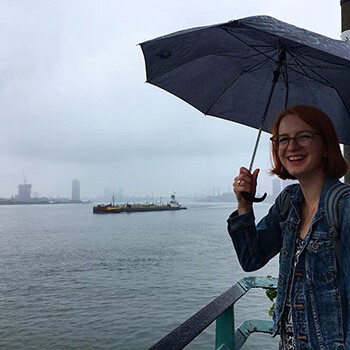Yale Junior Spends Summer Investigating U.S. Human Rights Abuses

Madeline Batt, a junior Political Science major in the Multidisciplinary Academic Program in Human Rights, spent last summer working at two different organizations: Solitary Watch4, a watchdog group that investigates the use of solitary confinement in the American criminal justice system, and the North Carolina Commission of Inquiry on Torture5, which is in the process of preparing a truth commission to hold North Carolina officials and companies accountable for the role they played in the CIA’s rendition, detention, and interrogation program. Maddy reflected on her experience at both organizations.
At my internships this summer, I was able to address human rights abuses perpetrated by the United States in both the domestic criminal justice system and international counterterrorist efforts. At Solitary Watch, I assisted the organization in its mission of investigating, documenting, and disseminating information about the use of solitary confinement in U.S. prisons and jails. I contacted a large number of incarcerated people to gain their perspective on articles we were writing; interviewed survivors of solitary confinement; and researched recent developments in solitary confinement reform in various states. I was also able to write several of my own articles, including one on the use of solitary confinement as punishment for nonviolent escape attempts and another on a Federal Bureau of Prisons report that confirmed that huge numbers of people with mental illness are kept in solitary confinement.
I addressed a set of related but distinct issues at the North Carolina Commission of Inquiry on Torture (NCCIT), which is especially concerned with investigating Aero Contractors, a North Carolina-based company that operated the flights that illegally transported detainees between secret prisons, where they were tortured by the CIA. I assisted the commission in preparing a briefing book for the commissioners who will ultimately preside over the hearing. In particular, I researched victims’ stories and the CIA’s rendition, detention, and interrogation program and wrote up my findings as chapters in the book.
Being surrounded by the stories of victims of U.S. torture was difficult at times. It was challenging and disheartening to realize just how many people have experienced severe abuse at the hands of American officials and to know how little the country has done to correct the damage it has inflicted. But the knowledge that I was taking concrete steps to expose, limit, and redress the kinds of human rights abuses that detainees faced prevented me from becoming too discouraged. Of course, I’m just one person, and advances in human rights happen slowly, but simply knowing that I was contributing to the extent that I could energized my efforts and gave me hope.

I am incredibly grateful to have been a part of Solitary Watch and the NCCIT this summer. I discovered what it means to work toward advances in human rights in a professional context and learned more about my own interests and goals. Most importantly, I had the opportunity to assist in the fight against torture in the U.S. I feel a responsibility to respond to human rights abuses perpetrated by my own country, and torture is one of the United States’ most serious and frequent violations. I am honored to have contributed to them this summer.


